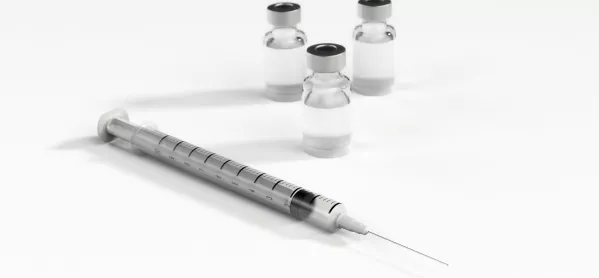The routine vaccination of schoolgirls with the human papillomavirus (HPV) vaccine in Scotland has led to a dramatic reduction in cervical disease in later life, new research suggests.
Later this year, the UK-wide immunisation programme will be extended to include 12- and 13-year-old boys.
HPV is a sexually transmitted infection and some types are linked to cervical cancer, one of the most common cancers in women aged under 35 in the UK. It is also linked to cancers that can affect men, such as cancers of the anus, penis, head and neck.
Quick read: Free sanitary products ‘misused’ by pupils
Background: Free sanitary products for college and school students
Opinion: ‘Periods aren’t shameful - let’s talk about them in school’
A decade ago, a UK-wide immunisation programme for girls aged 12 and 13 was introduced.
Researchers looked at the impact of routine vaccination on levels of abnormal cells and cervical lesions, known as cervical intraepithelial neoplasia or CIN, among women.
The higher the CIN grade, the higher the risk is of developing invasive cancer.
The team, led by Tim Palmer at the University of Edinburgh, analysed vaccination and screening records for 138,692 women born between 1988 and 1996 who had a screening test result recorded at age 20.
They found that compared with unvaccinated women born in 1988, vaccinated women born in 1995 and 1996 showed an 89 per cent reduction in CIN grade 3 or worse, an 88 per cent reduction in CIN grade 2 or worse, and a 79 per cent reduction in CIN grade 1.
Unvaccinated women also showed a reduction in disease, suggesting that interruption of HPV transmission in Scotland has created substantial “herd protection”, researchers said.
The study, published by the BMJ, concludes: “Routine vaccination of girls aged 12-13 years with the bivalent HPV vaccine in Scotland has led to a dramatic reduction in preinvasive cervical disease.
“The bivalent vaccine is confirmed as being highly effective vaccine and should greatly reduce the incidence of cervical cancer.
“The findings will need to be considered by cervical cancer prevention programmes worldwide.”
Dr Kevin Pollock, senior research fellow at Glasgow Caledonian University and study co-author, said: “The conclusion is that the vaccine has exceeded expectation.
“It is associated with near elimination of both low and high-grade cervical disease in young Scottish women eight years after the vaccine programme started.
“The figures are impressive and show a reduction of up to 90 per cent of cervical disease abnormalities - pre-cancerous cells.
“These data are consistent with the reduced circulation of high-risk HPV infection in Scotland and confirm that the HPV vaccine should significantly reduce cervical cancer in the next few years.
“Indeed, cervical cancer cases in women aged 20-24 have reduced by 69 per cent since 2012.”
Scotland’s public health minister Joe FitzPatrick said: “I welcome this positive news in the report from the BMJ.
“In Scotland, uptake for the HPV immunisation programme remains high and continues to exceed 80 per cent.
“We remain committed to ensuring Scottish girls benefit from this vaccine, which, as this study shows, will save lives.
“We are, of course, building on this success and extending the HPV vaccine programme to boys later this year.”





